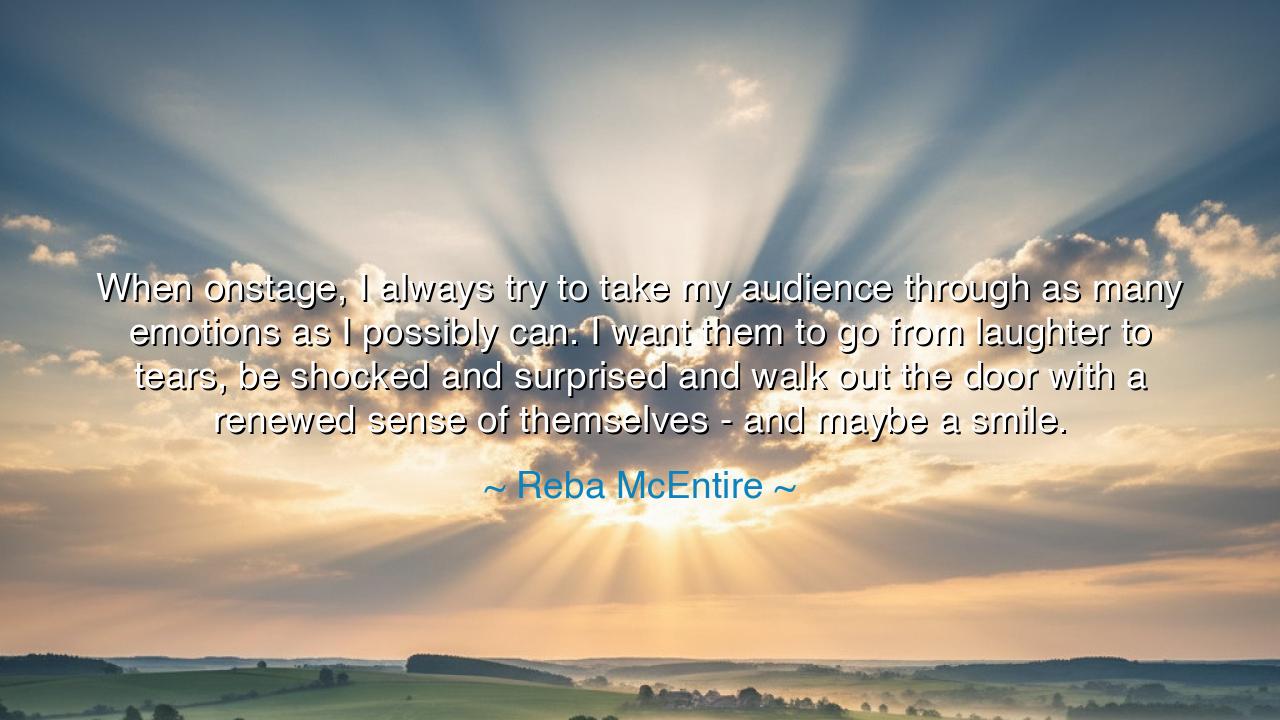
When onstage, I always try to take my audience through as many
When onstage, I always try to take my audience through as many emotions as I possibly can. I want them to go from laughter to tears, be shocked and surprised and walk out the door with a renewed sense of themselves - and maybe a smile.






Hear the words of Reba McEntire, born from the fire of performance and the tenderness of the human spirit: “When onstage, I always try to take my audience through as many emotions as I possibly can. I want them to go from laughter to tears, be shocked and surprised and walk out the door with a renewed sense of themselves – and maybe a smile.” This is not merely the creed of an entertainer—it is the creed of a guide, a teacher, a soul who seeks to awaken souls. For the stage, like life itself, is a sacred place of transformation, and the one who stands before others holds in her hands the power to change hearts.
The ancients knew this well. The Greek tragedians, Aeschylus, Sophocles, Euripides, did not write plays to entertain alone. They sought to lead their audiences through the depths of sorrow, the fire of anger, the sweetness of joy, and the release of catharsis. The theater was not a hall of distraction—it was a temple, where men and women left with a renewed sense of themselves. So too does Reba follow in this ancient lineage: she seeks to take her people from **laughter to tears, from surprise to reflection, and finally to a quiet smile, that symbol of peace after the storm of emotions.
The meaning of her words lies in the belief that art is not passive, but active. A song, a story, a performance must not leave the soul unchanged. To truly honor the gift of expression, the artist must dare to stir the depths of the human heart. For laughter alone is shallow, and tears alone may wound; but when laughter and tears are woven together, the soul is stretched, awakened, and restored. This journey through emotion is the very essence of life itself, condensed into an evening upon the stage.
History gives us noble examples of this truth. Think of Shakespeare, whose works endure not because of grandeur alone, but because he could move audiences from the absurd humor of clowns to the tragic deaths of kings, all within the same play. Hamlet’s brooding grief, followed by the wit of grave-diggers, then back again to the thunder of fate—this weaving of emotion reflects the fabric of real existence. It is what makes his work immortal. In the same way, Reba McEntire declares that true performance must mirror life, with its laughter, its sorrow, its surprises, and its ultimate peace.
There is also heroism in her desire that audiences leave with renewal. For in every age, people arrive at the theater carrying burdens: griefs unspoken, hopes unrealized, fears unnamed. The artist who dares to touch these wounds, who dares to lead souls through laughter and tears, gives them a priceless gift. They walk out not only entertained, but lighter, stronger, more alive. The artist becomes healer, prophet, and guide, and the closing smile is not trivial—it is proof that renewal has begun.
The lesson we must carry is clear: in all that you do—whether on a stage, in a classroom, at a table, or in your home—seek to leave others changed for the better. Do not settle for surface encounters. Bring laughter when it is needed, compassion when it is required, challenge when it is just, and hope when it is possible. Let others walk away from your presence not the same as they arrived, but renewed, awakened, perhaps even smiling through their tears.
Practically, this means living with intention in your relationships and your work. When speaking, do not only inform—move hearts. When comforting, do not only console—awaken courage. When sharing joy, do not only amuse—bring connection. Approach each interaction as an opportunity to give others a small journey, one that ends in greater strength, greater clarity, and perhaps the quiet peace of a smile.
Thus, let Reba McEntire’s words be passed down as ancient wisdom in modern song: “Take them through laughter and tears, surprise them, renew them, and leave them with a smile.” This is the calling not only of performers, but of all who touch the lives of others. For we are all players upon life’s stage, and the greatest measure of our role is not applause, but the transformation of hearts that have crossed our path.






AAdministratorAdministrator
Welcome, honored guests. Please leave a comment, we will respond soon